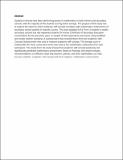| dc.contributor.author | Gachigi, Priscilla N. | |
| dc.contributor.author | King-White, Dakota | |
| dc.contributor.author | Kinai, Theresia | |
| dc.contributor.author | Kigen, Edward | |
| dc.date.accessioned | 2025-10-02T08:58:51Z | |
| dc.date.available | 2025-10-02T08:58:51Z | |
| dc.date.issued | 2019 | |
| dc.identifier.uri | https://doi.org/10.5539/jel.v8n3p102 | |
| dc.identifier.uri | https://repository.kcau.ac.ke/handle/123456789/1591 | |
| dc.description.abstract | Students in Kenya have been performing poorly in mathematics in both primary and secondary schools, with the majority of the students scoring below average. The purpose of this study was to explore the extent to which academic self-concept correlates with mathematics achievement of secondary school students in Nairobi County. The study targeted 9,641 Form 3 students in public secondary schools that had registered students for Kenya Certificate of Secondary Education examinations for the past three years. A sample of 500 respondents was drawn using stratified and simple random sampling. A questionnaire that included items from the Academic Self-Concept Questionnaire was used to measure academic self-concept. The average score in mathematics for three consecutive terms was used as the mathematics achievement for each participant. The results from the study showed that academic self-concept positively and significantly predicted mathematics achievement. Based on findings, this article includes recommendations on effective ways that teachers, parents, and other stakeholders can help increase students’ academic self-concept and boost students’ mathematics achievement. | en_US |
| dc.language.iso | en | en_US |
| dc.publisher | Journal of Education and Learning | en_US |
| dc.title | Assessing the Correlation Between Academic Self-Concept and Mathematics Achievement in Secondary Schools in Nairobi County, Kenya | en_US |
| dc.type | Article | en_US |

